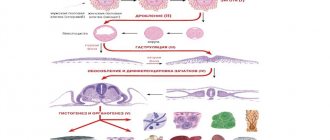More than 50% of expectant mothers complain of constipation during pregnancy, and about 30% experience it after childbirth. Doctors advise you to be attentive to your well-being and not take any measures on your own. Treatment of constipation while carrying a baby has its own characteristics: the use of a limited number of drugs and medications is allowed.
Constipation during pregnancy - 8 ways to get rid of constipation
Constipation is a disorder of the intestinal tract, which is expressed by:
- in long intervals between bowel movements, if we compare these periods before pregnancy;
- in difficulties arising during bowel movements (even if the usual frequency of stool is maintained);
- in periodically repeated sensations of incomplete emptying of the intestines.
During such a complication, the volume of feces released from the intestines decreases, and its density also changes (it hardens, its structure resembles a stone). Often, with constipation, you have to push, experience pain and discomfort in the abdomen.
What causes constipation in pregnant women?
Constipation during pregnancy is associated with prolapse of the uterus and a change in the position (displacement) of the intestines. Among the circumstances that cause constipation during pregnancy are of a psychological nature - the fear of harming the child during prolonged complicated bowel movements. Moreover, not following a proper diet and eating unhealthy foods also lead to this problem. Constipation in pregnant women is divided into two types: nutritional and mechanical.
Conditions for the occurrence of alimentary constipation may be:
- sudden intestinal decrease in the amount of water;
- reducing the amount of food and fluid in the body;
- The foods that dominate the menu do not contain enough fiber.
The reasons for the occurrence of mechanical constipation may be:
- Mechanical constipation occurs due to disruption or cessation of the movement of feces in the small or large intestine.
- Often, the structure of feces and its passage are affected by various diseases (renal failure, diabetes, hemorrhoids) and the use of certain medications.
Folk secrets for eliminating constipation
For constipation in pregnant women, even strict doctors recommend that before drinking a laxative from a pharmacy, try products with a laxative effect at home. Traditional folk recipes for correcting stool are based precisely on them:
- Beets are the best remedy for constipation, which has no contraindications and only has a beneficial effect on the functioning of the entire body. Boiled beets should be grated, lightly salted, seasoned with vegetable oil and consumed at least 100 g every day.
- Kefir has good abilities to normalize intestinal flora if you eat fresh kefir regularly in the mornings or evenings.
- Vegetable oil. You can drink vegetable oil to relieve constipation, but not castor oil, but 1 tbsp. l. Flaxseed oil in the morning on an empty stomach will ensure normal stool, and will also cover the body’s need for vitamins A, E and healthy fatty acids.
- Fresh vegetables and fruits. A natural laxative for pregnant women, it can be an ordinary fresh fruit. For example, an apple or a kiwi fruit. Apples are rich in iron and fiber, and kiwis are rich in organic acids that have a mild choleretic effect.
- Time-tested laxatives for pregnant women are dried fruits from which tea is made. 6 small prunes are poured with a glass of boiling water overnight. The tea is drunk in the morning, and the steamed fruits are eaten as a snack during the day.
Laxative products during pregnancy will help not only empty the intestines, but also enrich the expectant mother’s diet with substances necessary for the growth and development of the baby. During pregnancy, you can take chemical laxatives after consulting your doctor. Food products that are folk remedies weaken mildly, and therefore can be used independently by expectant mothers.
Expectant mothers very often complain about digestive problems that arise under the negative influence of environmental factors. During pregnancy, hormonal disruptions occur in the body of a pregnant woman, the diet changes, the stomach shifts through an enlarged uterus, which ultimately leads to disruption of the normal process of defecation. Next, we’ll take a closer look at how to properly treat constipation during pregnancy.
Causes of constipation at different stages of pregnancy
Constipation in pregnant women is caused by many factors. This is a restructuring of the general hormonal background, an increase in the size of the uterus and a functional shift in the intestines due to fetal pressure. Often, the reason for stool retention is a purely psychological reason, when a woman in an interesting position is afraid of strong strain during bowel movements, so as not to harm her child. In addition, anxiety about the possible appearance of hemorrhoids interferes with normal bowel movements.
Constipation during early pregnancy is caused by the following reasons:
- consequences of systemic diseases;
- decreased gastric secretion and reduction of its evacuation capacity;
- increased production of progesterone by the body, which reduces the intensity of intestinal motility.
Constipation during pregnancy in the 2nd and 3rd trimesters occurs for a number of reasons:
- Transformations occurring at the hormonal level and increased production of progesterone by the body, which helps reduce the tone of the muscles of the intestinal tract, which causes its hypotension.
- Lack of hard fiber in the daily menu, found in vegetables, fruits and grains. This also includes changes in taste preferences, in which, for example, greens or other necessary food products seem tasteless or generally unpleasant to a woman in a position.
- Insufficient water intake due to fear of possible swelling of the legs.
- Emotional stress, which almost all women experience during pregnancy, contributes to a decrease in intestinal motility. Fear of the upcoming birth and changes at the psycho-emotional level serve as a prerequisite for the occurrence of constipation of neurogenic etiology.
- Lack of physical activity, especially in the 3rd trimester of pregnancy, and when there is a threat of miscarriage, sometimes a woman has to remain in forced bed rest - leads to intestinal atony.
- Taking certain vitamins and microelements, which are sometimes recommended for pregnant women, is quite capable of causing a decrease in colon motility.
- A significant increase in the size of the uterus in later stages and a change in the location of any intestinal loop can dull the feeling of the urge to defecate.
- Increased manifestations of chronic gastrointestinal diseases, if they were observed before pregnancy.
How to treat constipation during pregnancy
Side effects of almost all medications, their ability to penetrate the placental barrier, and discomfort in health are reasons that make it impossible to use most traditional methods of healing. Let's look at some of the most harmless options for treating constipation using both traditional medicine and home remedies.
What pregnant women can do for constipation: medications
The effects on the body of almost all means that facilitate bowel movements are to improve intestinal motility. Treatment of constipation during pregnancy with laxatives is used if adjustments to diet and lifestyle do not give the desired effect. Taking into account that most pharmaceuticals are characterized by serious side effects, it is the responsibility of the doctor to prescribe them for the expectant mother and only after balancing the benefits of their use and the probable danger to the unborn child.
Laxative suppositories for constipation
Suppositories are most effective for chronic forms of constipation. There are 2 main types of rectal medications:
- Gas-forming:
- Evacuation (500 – 600 rub.);
- Bisacodyl (25 – 50 rub.);
- Dulcolax (200-250 rubles).
- Glycerin:
- suppositories with glycerin (100 – 120 rubles);
- Glycelax (83 – 152 rub.);
Dulcolax
The first category of drugs is prescribed for proctogenic constipation , the cause of which is a decrease in the sensitivity of intestinal receptors, weakening of the intestinal and pelvic muscles, the appearance of tumors, cracks, scars, hemorrhoids and inflammation of the anorectal area.
Suppositories of this type produce carbon dioxide, which irritates the intestinal receptors and stretches its walls. This improves peristalsis and promotes normal bowel movements.
Glycerin-based suppositories gently irritate the intestinal mucosa, softening stool and promoting natural bowel movements. However, it is worth remembering that drugs in this category are contraindicated for people with inflammation in the anorectal area, for example, hemorrhoids.
Should you see a doctor?
Constipation during pregnancy is not something to be taken lightly. Harmful substances that form in the large intestine during constipation can cause severe harm to the baby and the well-being of the pregnant woman. The frequent consequences of constipation can, in turn, provoke uterine hypertonicity, which can lead to miscarriage.
Constipation in pregnant women can lead to abnormalities in the intestinal microflora and contribute to the increased proliferation of bacteria. As a result of prolonged constipation, pathogenic bacteria freely enter the urinary system from the intestines. After some time, they can expose the genitals to infection, and also become the root cause of colpitis.
In addition, constipation during pregnancy in the first trimester increases the risk of purulent-septic complications in the future. For example, the possibility of postnatal endometritis or hemorrhoids during pregnancy increases, and the threat of premature birth increases.
The effect of constipation on childbirth
As already mentioned, frequent and painful constipation during pregnancy can negatively affect the health of the mother and fetus. Complications in the form of sexually transmitted infections resulting from intestinal dysfunction can have a particular impact.
Regular thrush can become a problem for a baby passing through the birth canal. The fungus can infect the eye sockets, get into the umbilical wound and onto the mucous membranes. Any infection associated with constipation must be identified and promptly treated.
What foods should you eat?
Since the treatment of constipation begins with non-medicinal measures, this first of all must include strict adherence to a certain diet. You need to include in your daily menu more products with a maximum content of ballast elements, for example, wheat bran. In addition, the use of kefir, prunes, and dried apricots in food helps reduce stool retention.
Dietary rules for a pregnant woman suffering from constipation:
- The main goal for solving the problem of regular bowel movements for a pregnant woman is the formation of a correct nutritional system, which she must adhere to.
- The correct choice of diet is extremely important, taking into account the type of pathology of intestinal motility. The possibility of a food allergy to any foods should be taken into account.
- Dishes should be prepared by steaming or baking, and fried foods should be excluded from the diet.
- It is recommended to eat small portions; you need to sit down to eat at least 5 times a day. The interval between each meal should be a maximum of four hours.
- You will need to abstain from fried foods, aspic, jelly, and jelly, as they inhibit intestinal motility, which causes problems with stool.
- Of course, you should diversify your daily diet with fresh vegetables and fruits.
- The body needs up to 2 liters of water per day - this is necessary so that food cellulose can better cope with its purpose as an absorbent. Mineral waters with medium or high mineralization, water with magnesium ions and sulfates are characterized by a laxative effect on the body. Table mineral water should be lukewarm, the option for drinking it is 2 to 3 times a day, 0.5 cups.
Foods that you need to remove from your diet or reduce their consumption, as they provoke flatulence:
- dishes with legumes, cabbage, spinach and sorrel;
- apple and grape juices;
- vegetables containing essential oils are radishes, onions, radishes, garlic;
- chocolate, sweets;
- rich pastries, white bread made from premium flour, pasta;
- rich meat broths, mushrooms, fatty meats, spicy dishes with a high content of various seasonings and spices, walnuts, hard cheeses and smoked meats and canned foods are excluded.
Is it possible to do an enema for constipation and how often?
In particularly advanced cases, when neither medications nor folk remedies give the desired result, you can resort to radical actions - give a cleansing enema.
The procedure must be performed strictly according to the recommendations of the treating specialist and only when other methods do not help.
If you have constipation due to Hirschsprung's disease, which is accompanied by a lack of normal bowel movements, an enema is necessary. This also applies to patients suffering from dolichosigma and paralytic ileus. In such cases, medications or a special diet do not always help fully. Therefore, a weekly bowel cleansing procedure with an enema is allowed for them.
In rare cases, the number of times can be increased to one enema every 3 days, then drugs that restore the intestinal flora are additionally prescribed.
If the doctor has rendered a verdict of “lazy bowels,” then giving an enema is allowed no more than 2 times a month. In old age, instead of a water solution, oils can be used to cleanse the intestines (up to 2 times a week).
At the same time, we should not forget that frequent such procedures provoke the development of intestinal dysbiosis, because regular enemas disrupt the natural microflora.
And some more information
Constipation during pregnancy can be completely prevented by following easy and simple prescriptions from gastroenterologists:
- You need to take healthy foods in small portions and do not limit yourself in drinking water in its different forms. The menu must include food products that have a laxative effect on the intestinal tract.
- If there are no contraindications, then feasible physical activity is undoubtedly important for a pregnant woman for the normal functioning of the whole body. Recommended walking, swimming in open water in the summer, and in the pool in winter, and special physical exercise for pregnant women will undoubtedly help the expectant mother improve the functioning of her intestines. After all, movement stimulates the peristalsis of the intestinal tract, but before starting such active exercises designed specifically for pregnant women, you should consult a gynecologist.
- Uncontrolled use of medications can only alleviate a woman’s condition for the first time, but will not remove the root cause of the disease, so self-medication is dangerous in itself, and especially for the expectant mother.
- So, for the healthy functioning of the intestinal tract, changes in diet, feasible physical activity and normalization of the woman’s emotional state are needed.
Folk remedies for constipation during pregnancy
The pregnancy period is especially amazing, sometimes unpredictable and each time unique for a woman. Alas, it is not always accompanied by exclusively positive emotions and vivid memories. Various unpleasant “surprises” await the expectant mother at every corner. According to some reports, more than 70% of pregnant women experience constipation in the second and third trimester of pregnancy, even if they had never known what stool retention was before. Constipation is considered to be the absence of bowel movements for more than 3 days, the stool is too dry and hard, there is little of it, and after going to the toilet there is no relief.
There are many reasons for this condition. The main one is the pregnancy hormone progesterone. It supports the uterus while relaxing the intestinal muscles. This fact, in turn, confirms that most often constipation during pregnancy cannot be avoided. Well, it is also known why it is dangerous for the mother and her baby. Among the main concerns are premature birth, as well as intoxication of both organisms as a result of retention of feces in the intestines.
Based on all that has been said, we conclude: you shouldn’t wait for everything to pass, but you need to do something. It is clear that during pregnancy every mother tries to use “chemicals” as little as possible, which is why many laxatives are prohibited. What will traditional medicine say? Yes, there are many remedies to help alleviate this unpleasant condition. Grandma's recipes include a huge number of different natural ingredients. But is everything suitable when a woman is in an interesting position? Alas, most even folk remedies are contraindicated during pregnancy, especially for herbs that have a laxative effect.
In this article we will talk about those methods that are allowed to be used during the period of bearing a child without fear for his health.
General recommendations
Let's start with something simple, because it is always important to start treatment in a timely manner. Do not wait until stool retention becomes so long and unbearable that it will already affect your overall well-being. As soon as you feel something is wrong (it’s hard to go to the toilet, the urge has decreased, the stool has become dry and dense) - act.
The most important thing is to reconsider your diet, since this factor also affects the occurrence of constipation. However, keep in mind that constipation can be “cured” with certain foods. So, what you can and need to eat:
- Foods rich in plant fiber, especially vegetables and fruits. They can be consumed both raw and steamed. Cabbage, onions, spinach, sorrel, and legumes are prohibited, as they increase gas formation.
- Dried fruits. Homemade “sweets”, decoctions, infusions, teas are prepared from them, and they are also eaten as usual. Prunes are especially useful for constipation (decoctions based on them act instantly).
- Cereals. Buckwheat, oatmeal, pearl barley, and millet help loosen stool, but rice and semolina, on the contrary, strengthen stool.
- Bread with bran. You shouldn’t overuse it, but it’s also not advisable to eliminate it completely; only white bread and all baked goods are prohibited.
- Dairy products. Their fat content should not be too high, and it is better to consume them in the afternoon. The exception is hard cheeses (they are contraindicated for constipation).
- Water. Drinking regime is a very important condition for preventing constipation. You should drink up to 2 liters of water per day if you do not have edema or heart problems. Every morning on an empty stomach, drink a glass or two of clean water at room temperature. Also in the diet should be liquid soups, fruit juices, uzvar, jelly, but strong tea and coffee are the best “buddies” for constipation.
- Eliminate sweets from your diet, especially chocolates that are too salty, smoked and fried. Such food will definitely not add health and strength to you.
Laxative products for constipation in adults
Patients suffering from constipation are advised to include dried fruits in their diet:
- apples;
- cherry;
- prunes;
- dried apricots
You should eat them on an empty stomach or drink compote made from them. Juices from:
- spinach;
- potatoes;
- beets;
- celery;
- carrots.
Doctors also advise eating more vegetables, onions, fermented milk products, cereals (buckwheat, pearl barley), and sauerkraut.
When to sound the alarm?
Constipation is considered a condition when there is incomplete bowel movement or absence thereof for more than two days. It is important to pay attention to this problem in time. Especially for women in delicate situations. Constipation is a dangerous condition for both the expectant mother and her fetus. Even if a woman does not feel pronounced unpleasant symptoms, if the bowel movement is regularly delayed, she should immediately seek help from a doctor.
Constipation occurs in 70% of pregnant women, more often in the second half of pregnancy. This fact is explained by the growing load on the intestines due to the enlargement of the uterus. The longer the period, the greater the baby’s weight, which means the pressure on the blood vessels also increases, lymph and blood flow slows down, and edema forms. All this leads to stagnation in the intestines.
The weakening of peristalsis is also affected by changes in the hormonal levels of a pregnant woman. This affects the work of almost all internal organs, as the increasing load is redistributed. It is for this reason that constipation occurs in early pregnancy. What to do in this case? Unfortunately, this condition is extremely difficult to correct. The fact is that during this period, most known medications can negatively affect the development of the fetus.
What is the danger?
The absence of bowel movements in an expectant mother, especially if constipation is a concern during early pregnancy, is an extremely dangerous condition for both the woman and the child. Even if severe symptoms in the form of pain, fever or other signs do not cause concern, the lack of natural bowel movements can lead to uterine tone and, as a result, miscarriage.
Why is constipation dangerous during pregnancy? If defecation does not occur within 5 days, then the feces harden, thereby the possibility of independent bowel movements is significantly reduced, and the likelihood of intestinal cracks (and with them bleeding) increases. In addition, during stagnation, rotting of the masses begins to occur. During the chemical reaction, toxic substances are released. Through the intestinal walls they enter the bloodstream, causing serious poisoning of the body. Hazardous substances can also penetrate the placental barrier, reaching the fetus and causing serious disturbances in its development.
Constipation harms for women
Severe constipation during pregnancy causes serious discomfort for a woman, accompanied by pain in the lower abdomen, flatulence and bloating. But these are all “trifles” compared to the dangers of constipation during pregnancy.
Haemorrhoids
Pregnant women have an increased risk of developing hemorrhoids. The enlarging uterus puts pressure on the intestinal walls and pelvic vessels, which disrupts blood circulation in them. During constipation, a full intestine additionally compresses the vessels, which slows down the outflow of blood from them. This condition leads to hemorrhoids. The first symptom of this disease is blood in the feces after bowel movement.
Cracks in the anus
If constipation continues for more than two days, the stool becomes hard and dense, they injure the sphincter muscles and mucous membrane, causing cracks to appear that will be difficult to cure.
Other gastrointestinal diseases
Consequences of constipation:
- inflammatory process in the rectum;
- enteritis caused by the reverse reflux of food into the small intestine;
- colitis.
Long-term presence of feces in the intestine leads to other intestinal diseases:
- deformations of the intestinal walls;
- development of gallbladder diseases;
- paraproctitis.
Intestinal and vaginal dysbiosis
When beneficial intestinal microflora dies while fighting pathogenic microbes, this condition is called dysbiosis, during which most vitamins and beneficial microelements are poorly absorbed by the intestines. This often causes:
- their lack;
- metabolic disorder;
- deterioration of the body's defenses;
- decreased energy supply of the colon epithelium;
- development of ulcerative colitis;
- irritable bowel syndrome.
With a negative change in microflora that occurs against the background of constipation, the local and general immunity of a pregnant woman is disrupted, which makes the body vulnerable to:
- colds;
- viruses.
Because the rectal wall is close to the vaginal wall, bacteria can easily overcome these barriers. With severe intestinal dysbiosis, the vaginal microflora balance is disrupted.
Intoxication due to severe constipation
The negative consequences of delayed bowel movements during pregnancy are due to the fact that feces enter the expectant mother’s body through the intestinal walls if they are not removed from the intestine for a long time. Toxic substances are absorbed into the blood, gradually poisoning the body. Poisoning is accompanied by:
- weakness;
- sleep problems;
- irritability;
- excessive fatigue;
- depression;
- discomfort in the abdominal area.
The longer a pregnant woman cannot go to the toilet, the stronger the intoxication of her body and fetus will be.
Postpartum infectious complications
Postpartum infection is a septic wound infectious pathology, which is distinguished by some features directly related to the anatomy of the reproductive organs and their physiological tasks. Infectious agents can be:
- coli;
- streptococcal bacteria;
- staphylococci;
- gonococci;
- other microorganisms.
Infection of a genital wound occurs when the balance of intestinal microflora is disturbed, in which pathogenic microorganisms predominate.
Let's sum it up
Harm of constipation during pregnancy:
- Chronic constipation can lead to poor performance, irritability, and insomnia.
- Due to the fact that the stool does not pass out, bloating begins in the abdomen and gas formation increases. An overcrowded colon can cause uterine hypertonicity. Increased tone threatens premature birth and prematurity of the baby. Constipation in the early stages can cause miscarriage.
- Fecal retention adversely affects the condition of the skin, rashes appear, dryness, and a healthy complexion is lost.
- Inflammatory processes may begin in the intestines.
- The condition of nails and hair worsens: with constipation, hair begins to fall out, becomes dull, dandruff may appear, and nails peel and break.
- A weakened body is susceptible to infections and viruses. Since a pregnant woman’s immunity drops and intoxication begins, this makes the immune defense weak and it ceases to cope with the elimination of pathogenic microorganisms.
- The risk of varicose veins increases. Against the background of long-term constipation, stagnation begins in the vascular system of the small pelvis, blood circulation in the lower extremities is disrupted, causing the veins to suffer.
- Constipation often becomes an impetus for the development of other diseases. Women with prolonged constipation may develop colitis, liver diseases, and pancreas pathologies.
- If we are talking about short-term constipation in the first and second trimester, then straining during bowel movements is not dangerous. But if fecal retention occurs in the last weeks of pregnancy, then strong pushing can become a stimulant for the onset of labor.
- With chronic and prolonged constipation, prolonged pushing leads to abnormal stretching of the ligaments and muscles that support the pelvic organs. This negatively affects labor and leads to prolapse of the uterus and vagina after childbirth.
Pushing is dangerous for pregnant women with gestosis, high blood pressure, threat of miscarriage, as well as diseases of the organs of vision and cardiovascular system.
What do you need to remember?
The course of pregnancy and the healthy development of the fetus inside the womb is determined by the woman’s lifestyle and her actions. Expectant mothers experience stool retention, but this phenomenon cannot be ignored, as it is harmful for both the pregnant woman and the child.
If a woman cannot cope with bowel movements on her own by adjusting her diet, then during a routine examination by a gynecologist she should be told about the problem. The doctor will find out the cause of the disease and recommend effective and safe treatment methods that will help avoid the consequences of constipation during pregnancy and after childbirth.
Can laxatives be used by pregnant women?
How to deal with constipation during pregnancy and can you take laxatives? Most medications are strictly contraindicated for pregnant women, as they can cause uterine contractions and lead to miscarriage. Some medications disrupt the water-salt balance, causing digestive disorders, abdominal pain, and diarrhea, which is also very dangerous for the expectant mother and her child.
But at the same time, not treating constipation is also extremely dangerous. What to do? First of all, preventive measures should be observed (which are described in detail below). But if the problem has already arisen, then under no circumstances should you self-prescribe medications or practice treating constipation with folk remedies. After all, even such seemingly safe herbal preparations as hay leaves, magnesia, Carlsbad salt, castor oil and others can cause irreparable harm to a pregnant woman.
Drug treatments
Constipation in the early stages should definitely be treated under the supervision of a doctor, because the risk of miscarriage cannot be excluded.
So, we can highlight the following safe drugs that are recommended for use during pregnancy:
- Drugs that stimulate the intestinal muscular system. This category includes Defenorm, Gutalax, Dulcolax and Sena.
- Osmotic agents that accelerate the production of fluid in the body to liquefy hard stool in the intestines. These are Duphalac, Lactuvit, Normolact, Magnesium Sulfate.
- Medicinal plants that restore normal stool, namely castor oil, flax and plantain seeds, chamomile flowers.
- Microclysters. Glycerin suppositories and Microlax are recommended for pregnant women.
Prohibited means
The use of the following medications during pregnancy is strictly prohibited:
- Enemas. This method is recommended only in an emergency, when you urgently need to cleanse the intestinal system of solid waste products. However, there are a large number of disadvantages, namely, during the procedure, beneficial bacteria, which are responsible for the digestive process, are washed out of the stomach along with pathogenic microflora. During pregnancy, an enema can cause contraction of the uterine muscles and lead to premature birth.
- Vaseline oil and castor oil. As you know, oils are characterized by high fat content, which will negatively affect the liver, intestines and pancreas of a pregnant woman.
- Laxative medicinal plants that cause severe intestinal spasms. This includes buckthorn bark, senna leaves, and rhubarb root.
- Drugs that intensively affect the intestinal mucosa. This includes Regulax, Senade and Dulcolax.
- Laxatives based on bran and seaweed.
- Osmotic preparations based on magnesia, Carlsbad salt, sodium, which negatively affect the water-salt balance of the pregnant woman’s body.
Only a doctor can choose the safest drug for constipation during pregnancy, taking into account the characteristics of her health condition.
Approved drugs
Below we offer safe medications for constipation during pregnancy:
- Duphalac, which contains lactulose. This component is safe for both children and pregnant women. Lactulose is not absorbed in the body, does not enter the circulatory system, but is gently excreted from the body along with hardened feces. That is why it is recommended to choose anti-constipation medications that contain lactulose.
- Glycerin suppositories. Suppositories based on glycerin are allowed from the first days of a baby’s life. Glycerin is not absorbed into the circulatory system, has a gentle effect on the mucous membrane of the large intestine, and accelerates the production of mucus, which is necessary to soften solid waste products.
- Microlax. This is a ready-made microenema, which is recommended for both children and adults. The drug contains safe components that accelerate the removal of solid feces from the large intestine. The positive effect occurs within a few minutes after using the enema.
Safe laxatives
At the first symptoms of constipation, you should immediately report the problem to your doctor. Only a specialist, having assessed the severity of the condition, can prescribe medications for constipation to the expectant mother. Thus, the safest are those that are not absorbed into the bloodstream. They are aimed at loosening (due to the absorption of large amounts of liquid from tissues) and natural removal of feces. These are so-called probiotics, which have a laxative effect. For example, Duphalac, Forlax, Tranzipek and others. In addition to their direct purpose, they help restore the intestinal microflora, which prevents the problem of constipation in the future. But even such medications have contraindications and side effects, so they should be used only in extreme cases and with great caution. In addition, you should not expect an immediate effect from the above drugs: the result can be noted only after a few days.
Treatment of gestational constipation
The range of medications approved for use in pregnant women is very limited. For expectant mothers, medications that irritate the intestinal epithelium, increase peristalsis and have a softening effect are contraindicated. During this period, doctors recommend using laxatives that do not harm the health of the mother and fetus and do not affect the course of pregnancy. For example, agents of the osmotic, isoosmotic group. These drugs do not penetrate the fetoplacental barrier, are not absorbed into the gastrointestinal tract, and do not change the tone of the inner layer of the uterus (myometrium).
Such products include “Fitomucil Norm”. The drug does not contain senna or components with teratogenic effects. The product contains natural sources of soluble fiber: the shell of plantain seeds, as well as the pulp of homemade plum fruits. “Fitomucil Norm” gently restores the rhythm of the intestines, normalizes stool, and facilitates the process of defecation. In addition, Fitomucil Norm is an English drug with guaranteed quality of raw materials and high efficiency and safety. Decoctions of prunes or rolled oats, as well as a mixture of dried apricots, raisins and honey, are good for constipation. Regular consumption of kiwi also helps normalize stool in pregnant women. But it is important to remember that not all common products and folk remedies can be used during pregnancy. For example, expectant mothers are prohibited from taking buckthorn, rhubarb and senna.
At the first symptoms of constipation, it is advisable to inform your doctor about this, and discuss with him the optimal way to combat constipation.
Microclysters and suppositories
During pregnancy, doctors may prescribe constipation medications such as suppositories or microenemas. They act locally, so they are quite safe for one-time use. It is recommended first of all to resort to the help of suppositories, since they do not contain various additives and have proven to be an effective remedy for constipation during pregnancy. If there is no effect, you can use drugs such as Normacol, Microlax, Norgalax. But such medications should not be used often: they can cause uterine contractions.
Proper nutrition for constipation during pregnancy is the safest and most effective method of dealing with the problem. The following foods should be added to your diet:
- containing fiber of plant origin: carrots, pumpkin, zucchini, buckwheat, oatmeal, barley, wholemeal bread;
- containing organic acids: dried fruits, in particular dried apricots, raisins, prunes, dates;
- dairy products.
Diet for constipation excludes foods such as:
- fat meat;
- baked goods and sweets;
- smoked meats;
- rice;
- potato;
- pasta;
- White bread;
- tea, coffee, sweet carbonated drinks.
Laxatives for constipation for the elderly
For older people, it is recommended to select gentle medications. Gentle laxatives include drugs containing lactulose. To relieve constipation, doctors prescribe the following medications:
- laxative suppositories (Glycerin 160-180 rub., Bisacodyl 25-30 rub.);
- tablets (Senade 500-600 rub.);
- powders (Forlax 150-400 rub.);
- herbal medicines (Fitolax 180-300 rubles, Proctophytol 60-80 rubles).
There are other laxatives that can make bowel movements easier for older people. They often contain rhubarb, senna, castor oil, phenolphthalein and other components that irritate the intestinal receptor apparatus.
Folk remedies
In folk medicine, herbs that have a laxative effect are widely used. But most of them cannot be used during pregnancy. Therefore, treatment of constipation with folk remedies during pregnancy is limited to only some recommendations and recipes based on products that activate peristalsis:
- before meals, drink 100 ml of cool water;
- mix 50 ml of aloe juice with a spoon of honey, leave overnight and take a teaspoon 3 times a day;
- drink prune compote.
Prevention
Constipation during early pregnancy can be prevented with the help of preventive measures. What is needed for this?
- Carefully monitor your diet: you need to eat fresh and boiled vegetables and fruits, and exclude fatty and sweet foods.
- Drink enough purified water.
- Lead an active lifestyle: do not forget about walks in the fresh air, visit the pool or gymnastics for pregnant women.
As we found out, constipation during early pregnancy is a very dangerous condition. Therefore, you should not prescribe medications yourself or resort to traditional medicine recipes. It is much more effective to seek qualified help in a timely manner and listen to the doctor’s recommendations.
Sources:
https://babyrebenok.ru/zapor-pri-beremennosti-8-sposobov-kak-izbavitsya-ot-zapora https://beremennost.net/narodnye-sredstva-ot-zapora-pri-beremennosti https://www. syl.ru/article/202717/new_zapor-pri-beremennosti-na-rannih-srokah-narodnyie-sredstva-lecheniya









